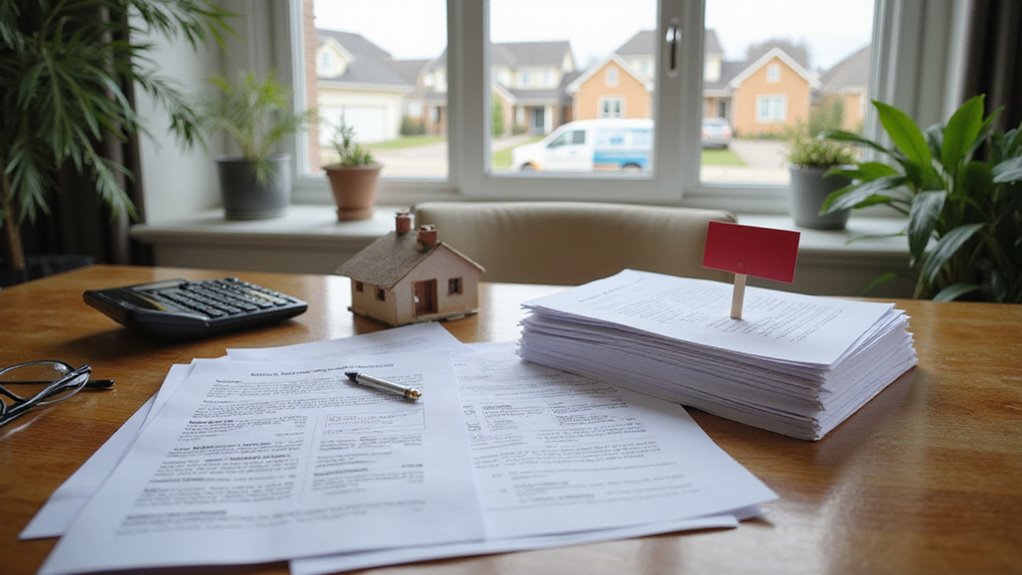Relocating for a new job or life change often means you must choose what to do with your current home. Should you sell it and cash out, or rent it and become a landlord? This decision can have a big impact on your finances and peace of mind.
Many homeowners feel stressed by this choice. Selling means giving up future gains, while renting brings worries about tenants and repairs. If you pick the wrong option, you could lose money or face ongoing headaches.
The best choice depends on your goals, local market, and comfort with risk. This blog will guide you through the pros and cons so you can decide with confidence. We will help you solve this problem step by step.
Key Takeaways
- Evaluate if you need immediate cash from selling or prefer steady income and long-term investment through renting.
- Compare potential rental income to your mortgage and expenses to ensure renting is profitable and sustainable.
- Assess local market conditions, including demand, pricing trends, and vacancy rates, to determine optimal timing and feasibility.
- Consider property management responsibilities, legal restrictions, and whether you have the time and resources to handle tenants and maintenance.
- Factor in emotional attachment, future plans, and whether holding or selling the property aligns with your personal and financial goals.
Assessing Your Financial Goals

Assessing your financial goals helps you decide whether to sell or rent your property. You should first identify what you want to achieve. Clear goals make your decision easier. Know your financial goals before choosing to sell or rent—clear objectives guide you toward the best decision for your property.
If you need quick cash, selling is usually the better choice. Renting may suit you if you want long-term income. Both options have risks linked to market changes. When you sell to a local home buying expert, you benefit from a fast and effortless process that avoids many traditional selling hassles.
You should compare possible rental income with your mortgage and other costs. If selling, the money could help pay debts or buy another home. Refinancing might let you use your home’s equity without selling.
If you define your needs and limits, you can make a better decision. A simple plan helps you weigh your options. Careful planning supports a smarter, more confident choice. If you’re looking for a fast, effortless process, selling your house for cash to a trusted local buyer might align best with your immediate financial needs.
Evaluating the Current Real Estate Market
To make a smart decision, you’ll want to analyze home price appreciation trends and measure local rental demand. Compare recent sales data and rental occupancy rates to see where the strongest returns lie. By grounding your strategy in current market metrics, you’ll position yourself for maximum financial benefit.
If you are considering selling without making repairs, it’s important to understand how as-is home sale conditions can impact your property’s pricing and buyer interest. You should also be aware of any land contract restrictions if you are selling a property you haven’t fully paid off, as these can affect your ability to transfer ownership or set your sale price.
Home Price Appreciation Trends
Home price appreciation trends show how much property values have changed over time. These trends help you decide if selling or renting is better. If you study these changes, you can make a smarter choice.
Local price growth tells you if values are rising or falling. You should look at both yearly and quarterly data. If your area has seen steady growth, keeping your property may bring more profit.
If there are many houses for sale and fewer buyers, prices may stop rising. Market saturation can slow down appreciation. You need to compare your area’s trends to regional or national data.
Understanding these patterns helps you plan your next step. You can sell if prices are high or rent if you expect more growth. Always use local data to guide your decision.
Rental Demand Analysis
Rental demand depends on how many people want to rent homes in your area. If demand is high, renting your property is easier. Low demand may mean longer vacancy periods.
You should check recent rental listings and see how fast units are rented. Vacancy rates can help show if there are more renters or empty homes. Short time on the market usually means strong demand.
Median rent prices for similar homes are important. High prices can mean more profit, but the property must match renter expectations. If luxury amenities are included, you may charge more rent.
Safety is a major concern for most renters. Review local crime statistics and neighborhood reputation before listing your property. If the area is safe, more tenants may be interested.
Demographic changes can also affect rental demand. For example, if more young professionals move in, demand for rentals may rise. Use this information to decide if renting your home is a good idea.
Understanding Tax Implications

Selling or renting your property affects your taxes in different ways. If you sell, you could qualify for a capital gains tax exclusion. This is up to $250,000 for individuals or $500,000 for married couples.
You must have lived in the home for at least two of the past five years to qualify. Any profit above this exclusion is taxed as a capital gain. Selling may result in a larger tax bill if your profit is high. The primary residence exclusion can be claimed every two years, as long as you meet the residency and ownership requirements.
If you rent your property, you can claim several tax deductions. These may include mortgage interest, property taxes, repairs, maintenance, and depreciation. Renting could lower your taxable income through these deductions.
You should compare the tax benefits of selling versus renting before deciding. Careful analysis helps you choose the best financial option. Understanding these rules can make your move more profitable. If you’re considering a fast sale, working with local home buyers can offer a transparent and commission-free process, which may further impact your financial outcome when relocating.
Calculating Potential Rental Income
Before renting your property, estimate its possible rental income by checking similar local listings. Look at recent rental prices and local vacancy rates. These factors help you set a realistic rent.
If rents in your area are rising, demand may be high. Falling rents can mean fewer people are looking to rent. Property values can also affect how much rent you can charge. Local sellers sometimes choose to work with family-owned local buyers who offer flexible closing timelines and handle all paperwork.
Check the average rent for properties like yours. Consider past and current trends to predict future income. Seasonal changes and economic shifts can impact rental demand.
If vacancy rates are high, you might need to lower your rent. Low vacancy rates can let you charge more. Careful research helps you set the right rental price.
If you ever decide selling is the better option, remember that some local North County, MO buyers offer fair cash offers with no commissions or hidden fees, making it easy to move forward without the hassle of renting.
Weighing the Costs of Property Management

As you consider renting out your property, factor in management fees—typically 8% to 12% of monthly rent—and additional expenses like repairs and tenant screening. You’ll also need to assess the time you’ll spend handling issues yourself versus outsourcing tasks. These costs directly impact your net rental yield and long-term financial strategy.
If you want to avoid these ongoing obligations, selling your house to cash home buyers who purchase properties as-is can offer a fast, hassle-free alternative. Additionally, if you’re seeking a stress-free selling experience without the ongoing headaches of property management and tenant issues, selling your house as-is to a local, trusted buyer may be the better option.
Management Fees and Expenses
Management fees and expenses are important when renting out your home. Property managers usually charge 8% to 12% of the rent each month. These costs reduce your rental income.
Other costs include leasing fees, which are often equal to one month’s rent. Maintenance and repairs can add up and are sometimes overlooked. Legal and administrative fees cover things like leases and possible evictions.
Vacancy costs can occur if your property is empty for a while. If you want steady profits, you should plan for all these expenses. If you do not consider them, renting may not meet your financial goals.
Time Commitment Required
Renting out your home takes time, even with a property manager. You must help with staging, tenant screening, and repair approvals. Maintenance and inspections can take extra time, especially if you live far away.
Here is how the time involved in renting may feel:
| Scenario | Emotional Impact |
|---|---|
| Late-night repair calls | Stress and fatigue |
| Frequent inspections | Anxiety, disruption |
| Staging for new tenants | Overwhelm, pressure |
| Juggling contractors | Frustration, burnout |
You should consider your schedule and energy before renting. If you are starting a busy job, property issues could distract you. Weigh the rental income against the time you need to spend managing the property.
Considering Future Return on Investment
You should consider future return on investment when deciding to sell or rent your property. ROI helps you measure possible profits over time. A careful review of data can guide your choice.
Check local property appreciation rates before making a decision. If prices are rising, holding the property could bring better gains. Falling prices might suggest selling sooner is safer. If you want to avoid stressful selling situations, working with a local home buyer who offers quick, cash sales may make selling more attractive.
Compare possible rental income to your mortgage and upkeep costs. Renting only makes sense if income covers these expenses. Extra rental profit can improve overall ROI.
Review current and future tax benefits for landlords. Some tax breaks may increase your long-term gains. If these change, your decision may also change.
Think about past market ups and downs in your area. High volatility can raise the risk of property value loss. If the market is unstable, selling now could be wiser.
Consider selling costs now and expected market conditions later. If costs are low now but may rise, selling soon might help. Future changes could shift the balance.
You should also factor in capital gains tax implications, as selling a property at a higher value could create new tax obligations that affect your ultimate return.
Factoring in Your Emotional Attachment

Your feelings about your home can strongly affect your choice to sell or rent. Emotional attachment often makes this decision harder. If your home holds many memories, letting it go may not feel right.
Some people find it stressful to see others living in their old space. Others may feel better keeping the property for sentimental reasons. If emotional value is high, you may choose to keep the home even if it is less profitable. If you decide to sell, you might appreciate the quick and easy home-buying process now available from reputable buyers, which can help make the transition less stressful.
It helps to ask yourself how much your feelings matter in this choice. If you value memories more than money, keeping the home may make sense. Balancing your emotions with financial facts leads to a decision that fits your needs.
If you are considering selling, be aware that legal obligations when selling a house—such as disclosure requirements—can also influence your comfort level and peace of mind with the process.
Analyzing Local Rental Demand
Rental demand shows how many people want to rent homes in your area. Strong demand usually means your property will rent quickly and at good prices. Weak demand can lead to empty units and lower income.
High rental demand means your property is likely to rent fast and at favorable rates, while low demand risks vacancies and reduced income.
You should check past occupancy rates for similar homes nearby. If rates are high, people likely want to rent in your area. If rates are low, you might face longer vacancies.
Rental prices can change if property values rise or fall. Compare recent rent changes to how property values have moved. If rents are rising faster, demand may be strong.
Employment growth often brings more renters to the area. Population trends can also show if more people are moving in. If both are increasing, rental demand may grow.
Rental listings can tell you how fast homes are rented out. Short listing times suggest strong demand. Long times often mean fewer renters are looking.
Local amenities and new infrastructure attract renters. Good schools, parks, and transit options boost demand. If these features are lacking, rental demand may be weaker.
If you’re considering selling instead of renting, remember that selling a house as-is in Affton, MO can save you time, avoid repairs, and eliminate commissions or fees.
Reviewing Mortgage and Loan Restrictions

You need to check your mortgage or loan agreement before renting out your property. Many lenders have rules that may not allow renting. Breaking these rules can lead to penalties or even force you to repay the loan early.
Some loans, like FHA or VA loans, require you to live in the property. If your loan is for owner-occupied homes, it may block renting for a certain period. About 20% of U.S. mortgages do not allow renting in the first year.
Always contact your lender to check for any rental or subletting restrictions. If you ignore these clauses, you risk your financial health and borrowing ability. Make sure your rental plans follow your loan requirements.
Planning for Maintenance and Upkeep
Rental properties need regular maintenance to stay in good condition. A clear plan helps keep tenants happy and protects your investment. Good upkeep also helps you follow housing rules.
Proactive maintenance can cut emergency repairs by up to 40%. It also helps your property last longer. If you have done recent renovations, careful planning is even more important.
You should schedule regular inspections to find problems early. A dedicated maintenance fund helps cover unexpected costs. If you build strong relationships with contractors, repairs get done faster.
Always document repairs and upgrades for future reference. Plan updates like painting or replacing appliances to keep your property attractive. A careful approach can increase profits and keep tenants longer.
Preparing for Possible Vacancy Periods
You’ll need to factor in the financial impact of unoccupied months by setting aside reserves that cover your mortgage and essential expenses. Analyze local vacancy rates and adjust your marketing tactics—such as targeted online advertising or flexible lease terms—to reduce downtime. Taking a data-driven approach helps you minimize losses and secure tenants more efficiently.
Budgeting for Unoccupied Months
You should prepare for months when your rental has no tenants. Empty periods can happen even in well-kept homes. Planning ahead helps you handle these gaps without stress.
Most landlords have one or two vacant months each year. If you want to avoid money problems, save for these times. Check how often rentals are empty in your area.
Always know your fixed costs, like your mortgage and insurance. If the home is empty, you still need to pay these bills. Set aside enough money to cover at least two months of expenses.
Adjust your rent for busy and slow seasons if you rent short term. Watch local rental trends to help you plan better. If demand drops, lower your price to attract tenants.
Marketing Strategies for Tenants
Vacancy periods are common, but good marketing can help fill rentals faster. Landlords should use websites like Zillow or Apartments.com. These sites help reach people looking for rentals quickly.
High-quality photos and virtual tours attract more attention online. Properties with professional pictures rent faster than those without. If you can, invest in good visuals for your listing.
Clear tenant screening criteria in listings save time for everyone. This lets renters know if they qualify before applying. If you outline requirements, you will get better applicants.
Flexible lease terms, such as 12 or 18 months, attract more renters. Offering choices can make your property more appealing. If you allow options, you may fill vacancies sooner.
Prompt replies to renter questions reduce vacancy times. Units with fast responses are rented out 25% faster. If you answer quickly, you will likely rent your unit sooner.
Determining Your Timeline for Relocation
To plan your move, set a clear timeline from the start. A well-defined schedule helps you save money and avoid stress. It also makes each step easier to manage. Start with a clear timeline—saving money, reducing stress, and making each step of your move easier to handle.
You should match your moving date with your job start date. If you do this, you can prevent last-minute problems. Smart timing helps you feel more prepared.
Housing market trends can affect your results. If you sell or rent at the right time, you may get better offers. Market research helps you choose the best dates.
Your property may need repairs or cleaning before you list it. Allow time for these tasks so your home is ready on schedule. Quick fixes can lead to better outcomes.
Personal needs, such as school or family, can shape your plan. If you consider these, your move will go more smoothly. Travel plans should also fit your timeline.
Unexpected delays can happen at any time. If you add extra days for setbacks, your move will stay on track. Being flexible helps reduce stress.
Navigating Legal and Regulatory Requirements
Before selling or renting your home, you must know all legal and regulatory rules. These include local laws, zoning rules, and HOA guidelines. If you ignore them, you could face fines or delays.
Some cities require special permits or licenses for rentals. Short-term rentals often have extra restrictions. If your property is in an HOA, check if rentals are allowed or if approval is needed.
The National Multifamily Housing Council reports that 35% of HOAs limit rentals. Almost half of cities have their own permit rules. You should confirm all requirements before listing your home.
Meeting these rules early can save you money and time. If you plan ahead, you will avoid last-minute problems. This approach helps your move go smoothly.
Exploring Alternative Options
Once you meet all legal requirements, selling or renting are not your only options. There are other ways to use your property. These alternatives can help you earn more or keep your options open.
You can try a lease-to-own agreement if you want steady income and possible future sale. Short-term vacation rentals work well if your area attracts tourists. Staging and flipping may suit you if you can invest in upgrades for a higher selling price.
Owner financing is useful if buyers cannot get regular loans. You might also form a joint venture with investors to share risk and profit. These options depend on your goals, market trends, and comfort with risk.
Conclusion
If you are deciding between selling or renting your home, it is important to look at your finances and goals. If you want fast cash, selling may be the better choice. If you want steady income, renting could work for you.
If your home needs repairs or you want a quick sale, we buy houses for cash. This option can save you time and reduce stress. If you prefer a simple process, a cash sale might suit you best.
If you are ready to make a decision, we at Freedom Path Investors can help. We make selling your house quick and easy. Contact us today to get started.







